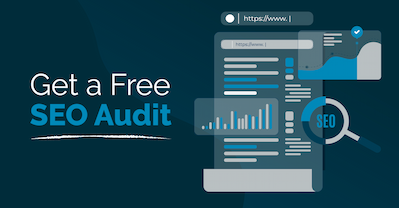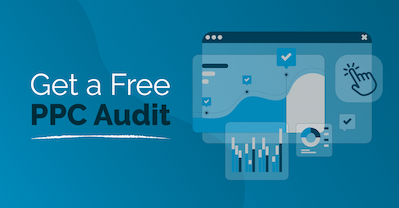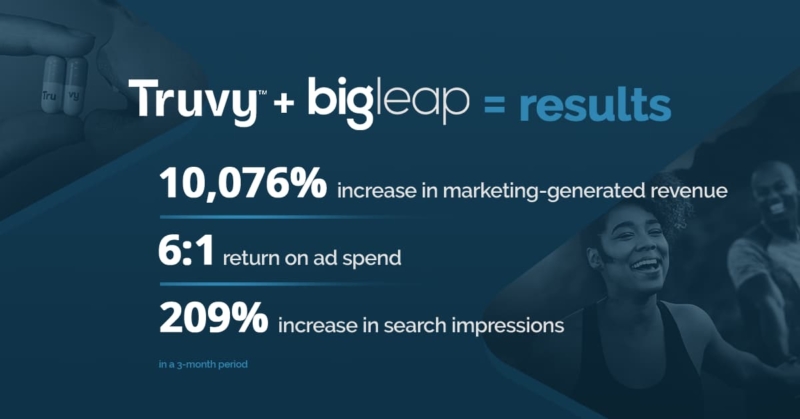*Updated 12/19/2023
Whether you’re flirting with the idea of PPC services or starting to shop around, we’re here to give you the lowdown on costs, services, package options, and other vital details. PPC marketing is highly effective, with Statista reporting that businesses will spend over $120 billion on this type of advertising in 2024.
We understand time is of the essence, so let’s get right into it. Here’s what you can expect from Big Leap’s flexible PPC Management packages and costs and budgeting factors to consider.
Flexible PPC Management Package Costs vs. À la carte
Packages
We don’t take a one-size-fits-all approach; every client has individual aims. To accommodate, Big Leap’s PPC management packages are flexible and customizable, depending on your needs and goals. Our flexible PPC management costs include the following:
- Setup fee: Generally speaking, you can expect a one-time setup fee of $1,500. This cost enables our team to position you for optimal success by conducting the following:
- Campaign setup
- Tracking and attribution audit, update, and/or setup
- Conversion rate optimization (CRO) audit
- Full funnel audit, update, and/or setup
- Creative asset audit
- Management fee: We charge a $2,500 minimum retainer per platform or percentage of ad spend (whichever is greater). Management fees are monthly recurring charges that allow our team members and partners to perform the necessary tasks for campaign success.
Examples of these tasks include:
-
- Full-funnel campaign creation and management
- Tracking and attribution monitoring and updates
- Advanced analytics monitoring
- Reporting and data-driven strategic campaign refinement
- CRO recommendations
À la carte
In addition to our flexible package options, we offer services a la carte. Perhaps you’re looking for a few services here and there, e.g., designing social ads or setting up one PPC ad on Meta). We can accommodate!
The cost for these services is a minimum management fee or ad spend percentage (whichever is greater). Your exact costs will depend on the type of service you’re looking for, so it’s best to chat with a PPC specialist.
PPC Project Quote Process
If you’re interested in getting help with your PPC ads and campaigns, Big Leap has a complete in-house PPC team that can assist. We also have a creative services team to provide support with ad or landing page copywriting.
Receiving a quote entails three steps:
- We connect you to our sales team for information about your business and goals.
- We create a detailed estimate and statement of work, which we will send you for approval.
- We present you with a contract based on the agreed-upon details.
Complete List of Available PPC Services
Review this overview of the services available in your personalized PPC plan:
- Full funnel campaign creation and management
- Tracking and attribution monitoring and updates
- Advanced analytics monitoring
- Reporting and data-driven strategic campaign refinement
- CRO recommendations and/or development work
- Buyer persona and audience identification
- Landing page creation
- Ad copywriting
- Retargeting
- Ads on different platforms
- Google Display Network (GDN)
- YouTube
- Meta/Facebook
- Google Shopping
- Competitor analysis
- Heat-mapping implementation
PPC Agency vs. Freelancers
One question often arises: Why should we use your agency instead of a freelancer? Of course, freelance work has some pros (like lower costs), but a reputable agency can bolster your business value. In other words, we:
- Increase revenue
- Reduce costs
- Achieve cost avoidance
- Establish necessary insurance
With the right agency, you’ll have a dedicated PPC team invested in high-quality work and producing long-term results. You’ll also have access to broad experience across industries—a holistic perspective and approach that will inject your campaigns with the right focus and expertise.
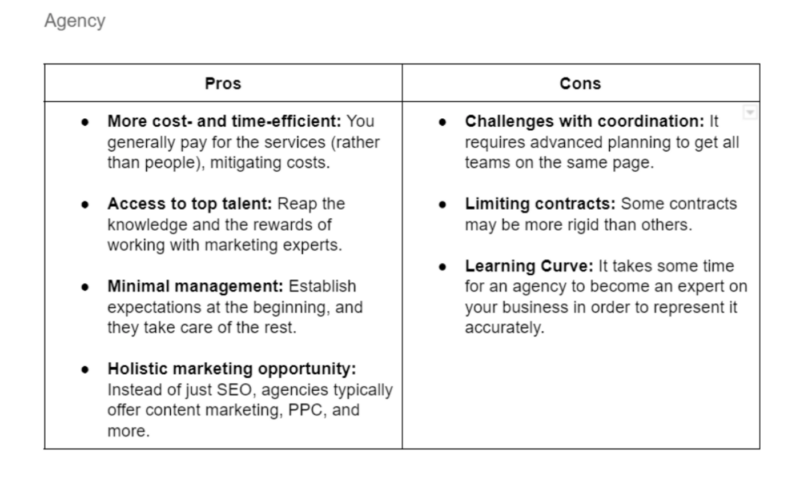
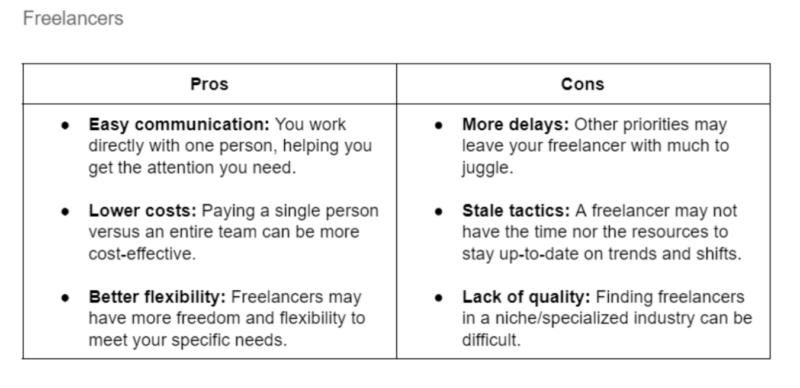
Truvy + PPC Agency = Lucrative Results
Don’t just take it from us. It’s all in the data.
Truvy, a health and wellness agency, partnered with us for SEO and PPC support. We already had insights from previous SEO and marketing automation campaigns and leveraged that data to make informed decisions regarding paid ads.
The result? A long-term, lucrative partnership that achieved the following goals:
- 10,076% increase in marketing-generated revenue
- 6:1 return on ad spend
- 209% boost in search impressions.
Now Comes the Budget—How Much Should I Spend on Marketing in General?
We get it, you’re on a tight budget. But you can’t afford to not spend money on advertising—as the adage goes, it takes money to make money. It certainly works here, because for every $1.00 spent on Google Ads, you can generally earn an average revenue of $2.00.
Let’s start with the basics—But how much should you spend on marketing, including SEO, content marketing, paid ads, et cetera? You may be expecting a complicated or generic answer, but we’re all about transparency here at Big Leap, so here’s the straightforward answer you need.
- Small businesses with less than $5 million in revenue should allocate 7–8% of it to marketing (assuming you have a profit margin of 10–15%).
- Small businesses with more than $5 million in revenue should consider allotting 12–20% of their gross revenue to marketing.
- Medium- to large-sized businesses with $500 million to $20+ billion in revenue typically spend ~10% of their revenue on marketing, but that’s expected to grow.
Specific numbers vary, so here are some examples of marketing spend per industry. Where do you fit?
- Manufacturing = 8%
- Finance/insurance = 8%
- Retail wholesale = 10%
- Service consulting = 12%
- Communications/media = 13%
- Consumer services = 15%
- Tech software/biotech = 15%
- Consumer packaged goods = 24%
For a more personalized calculation, use our custom digital marketing calculator to estimate the best budget for your business. We conducted extensive research to discover how to allocate budgets best according to your industry, annual revenue, and desired aggression level. With just these three inputs, we crunch the numbers and deliver a suggested budget that meets your criteria.
Budgeting for PPC: Things to Consider
As you try to come up with your own budget for paid advertising, it can help to consider what others do. Marketers tend to spend 9% of their budget on paid search advertising, 14% on social media marketing, and 16% on paid display (with almost half of that focused on retargeting).
But there are other costs associated with paid advertising you may not have thought of yet. Paying for time strategizing and managing projects is one of them. Designing graphics and copywriting are others. Be sure to make room in your budget to account for these other necessary expenses.
Setting Budget According to Growth Goals
Before even considering your budget, you need to establish your goals, as these will guide your numbers.
Some questions to ask yourself are:
- What breadth of audience am I looking for?
- How many new leads per month do I want to get?
- How much revenue am I trying to make?
- How much traffic will help me reach my goals?
- How much more money do I need to spend to reach my goals?
How to Track Costs and Measure Results
After you set goals and implement a budget, it’s time to track and measure key metrics to gain insight into the effectiveness of your efforts. Otherwise, you’ll have no idea whether you’re heading in the right direction to achieve your goals or have gotten wildly off track.
To help track your costs and measure the results, here are some analytical tools to hook on your belt:
Don’t forget to also track phone calls, as these won’t show up automatically in your analytics.
Calculating Proper PPC Costs for Your Business
If you have a budget of $1,500 per month and it costs an average of $5 per click in Google Ads for your targeted keywords, you can buy yourself 300 site visits. Out of these, it’s possible to convert 18 of them into new customers (using a 10% website conversion rate and 60% lead-to-customer conversion rate).
If you are looking to get more than that—let’s say you’re aiming for 48 new customers—the calculations work out to mean you’ll need to spend $4,000 per month to hit that goal.
Now, let’s see if that $4,000 spent on 48 new customers is worth it. If each customer represents an average revenue of $500, your ROAS is:
($500 average revenue per customer x 48 customers) / $4,000 money spent per month = 600% ROAS
We’d say that’s a sweet return!
But hold up…that’s only part of the picture. You’ve got to calculate your ROI to account for your other costs and profits. If it costs you $9,000 in labor/supplies to produce $24,000 in sales from your 48 new customers, you’re looking at a gross profit of $15,000. Subtract the $4,000 Google Ads expense, and you’ll be left with $11,000.
With these numbers, you can now calculate your ROI:
($15,000 gross profit – $4,000 Google Ads expense) / $4,000 Google Ads expense = 275% ROI
This is a healthy return on PPC costs, one that should entice you to continually make this investment.
We probably should’ve mentioned this earlier, but there’s an Advertising ROI Calculator you can use for free. You’re welcome.
Avoiding Costly PPC Mistakes
Avoid making costly PPC mistakes to optimize your marketing campaigns and get the results you’ve been working/hoping/asking for.
Don’t:
- Increase your budget too quickly trying to push for first position on the SERP (search engine results page).
- Use negative keywords that waste your budget.
- Write boring and unemotional ad copy that doesn’t entice your audience to act.
- Neglect your landing pages because long load times and irrelevant content won’t help you or your users.
- Let location targeting slip, since that’ll decrease local engagement.
- Forget ad extensions, since they increase CTRs, quality score, ad rank, etc.
- Be too broad by targeting everyone—it’s not effective.
- Neglect using ad schedules to display ads or change bids when customers are most active.
- Risk your brand name and budget by committing or being a victim of click fraud.
- Set and forget your campaign instead of continually collecting data, analyzing performance, and tracking success.
- Test the wrong metrics, but focus on aligning your ROI with your benchmarks and goals instead.
Lean on a Reputable PPC Agency
Not all PPC agencies deliver the same results. At Big Leap, we leverage over 15 years of experience in the industry to ensure high-quality, long-term results. Our PPC team looks forward to hearing about your goals and working alongside you to achieve them. Reach out!

